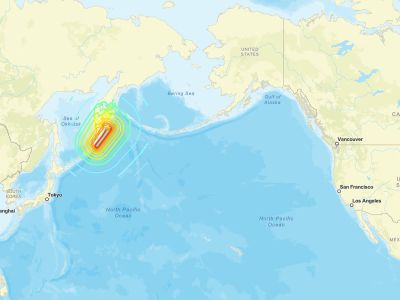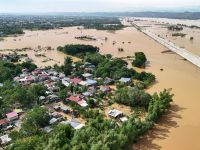The Arab League and EU countries warned against a US attack on Iraq, seen by diplomats as “certain.” Meanwhile, British Prime Minister Tony Blair said Wednesday he fully agreed with US President George Bush's latest warnings to Iraq over its suspected efforts to develop weapons of mass destruction, but cautioned against any hasty response to the problem, said agencies.
President Bush warned Iraqi President Saddam Hussein on Monday to allow UN weapons inspectors back into the country “to prove to the world he's not developing weapons of mass destruction.”
Asked what would happen if Saddam refused, Bush replied: “He'll find out.”
According to the Associated Press, Jordan and the Arab League appealed to the United States not to attack Iraq, saying Wednesday that such a strike would have dangerous consequences.
Jordan “rejects the use of force, external interference in Iraq's affairs and meddling with its integrity,” Saleh Qallab, a government spokesman and a minister of state was quoted as saying.
In Cairo, the secretary general of the Arab League, Amr Moussa, reiterated Wednesday that any attack on an Arab country would have “dangerous repercussions” and would affect the political climate in the region.
“Arab public opinion is completely outraged because of what is happening in the occupied territories, “ Moussa said, referring to the 14 months of Israeli-Palestinian fighting.
German Chancellor Gerhard Schroeder warned Wednesday against taking the war on terrorism to countries beyond Afghanistan, said AFP.
Schroeder told parliament it was essential to maintain the international coalition against terrorism and called for restraint in the debate on the future of the military campaign.
"We should be very cautious in particular in talking about new targets in the Middle East. We could take on more than any of us is capable of handling," Schroeder said during a debate on the 2002 budget that drifted to foreign policy issues.
"We will do what is necessary, but will reserve the right to decide what is necessary," he said of Germany's role in the campaign.
Foreign Minister Joschka Fischer of the Greens party added in comments before the lower house of parliament, the Bundestag, that European Union leaders were unanimous in their deep skepticism about putting Iraq in the crosshairs.
"We have explained that at length to our partners in the United States," he said, adding that it would be better to focus efforts on finding political solutions to the conflicts in the Middle East than to widen the military campaign.
He added it would be "irresponsible to look for new targets" to attack.
Fischer said that Germany would abide by its military commitments in the alliance against terror and noted that Germany had consistently supported weapons inspections by international observers in Iraq.
And in Sofia, Bulgaria, French Defense Minister Alain Richard said he saw no reason for the international military campaign against terrorism to move beyond Afghanistan for the time being.
Richard said France would back military action if there were compelling evidence that a nation was supporting Al Qaeda, Osama bin Laden's terrorist organization. Bin Laden is the prime suspect in the Sept. 11 terror attacks.
But Western diplomats familiar with US policies told AFP Wednesday that the United States will certainly carry out an attack on Iraq but "the question is when.”
According to these diplomats the anti-terrorist campaign spearheaded by the United States following the September 11 strikes on New York and Washington "will certainly lead to strikes on Iraq.”
One Western diplomat said that Washington "is resolved to put an end to Saddam Hussein's development of weapons of mass destruction and the risk that the Iraqi leader obtain nuclear weapons."
These diplomats believe that unlike the 1991 US-led war to liberate Kuwait from Iraqi occupation, the United States is now more determined than ever and ready to take the risk of sustaining US war casualties.
A military campaign against Iraq will be essentially aimed at "breaking the regime of Saddam Hussein and destroying his armament," one diplomat said.
He also disagreed with many Arab leaders who fear that an attack on Iraq will have "catastrophic" consequences.
"A real democracy in Iraq will be beneficial for many Iraqis and for Arab countries," the diplomat said.
Meanwhile, Blair said any extension to other countries of the US-led military campaign against suspected terrorist networks in Afghanistan should be carefully considered.
"I have always said there would be two phases of this operation. The first is in Afghanistan and our military action is focused in Afghanistan," he said.
"The second is, in a deliberative and considered way, to take what action we can against international terrorism in all its forms," Blair said.
Blair's comments came in response to a question in the House of Commons on the risk of extending the current conflict in Afghanistan to other countries -- Albawaba.com
© 2001 Al Bawaba (www.albawaba.com)









